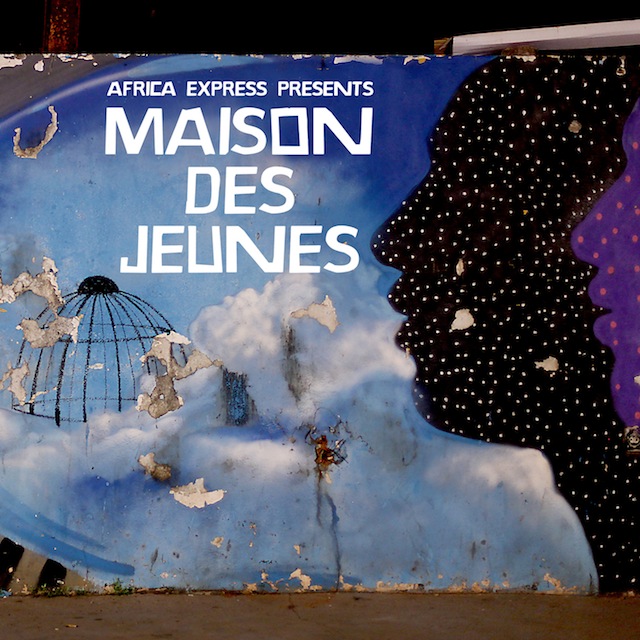It would be an understatement to say that Mali has had something of a rough time these past few years. The combination of a coup and a rebellion have challenged the famously multi-cultural society, and many Malian musicians have faced a choice of either exile or a threatened existence in their native land. Despite this, Mali has long been known as a hot spot for amazingly talented traditional and popular musicians for centuries, and this current time of crisis is no exception. Maison Des Jeunes shows that music is alive and well among the youth in Bamako.
There are not as many successful collaborations between African and non-African artists as one might expect in these times of musical globalization, but this is certainly one of them. The artistry of the young Malian musicians is placed at the forefront of the music on this album, while the production aesthetic and elements of certain songs bear the tasteful stamp of Africa Express's producers, particularly Damon Albarn, who is better known for his critically and commercially acclaimed work with the groups Blur and Gorillaz. The organizers set up a mobile studio for a week at a youth center known as Maison Des Jeunes (hence the album title) on the banks of the Niger in Bamako. Considering it was recorded in only one week of first-time collaborations, the result is nothing short of astounding.
In particular, it is satisfying to hear an album which features traditional Malian music that is not presented as glossy, sanitized “world music,” but as rough, raw, live jams, side by side with more current rap and electro tracks. The western musicans and producers--André de Ridder, Brian Eno, Cid Rim, Damon Albarn, David Maclean (Django Django), Ghostpoet, Holy Other, Jeff Wootton, Lil Silva, Nick Zinner (Yeah Yeah Yeahs), Olugbenga Adelekan (Metronomy), Pauli The PSM, Remi Kabaka, Sammy Jay, Seye and Two Inch Punch--knew when to get out of the way and let the Malian artists shine, which is crucial for this kind of project.
The album opens with Adama Keita playing kamale ngoni and singing over panning synths and a beat that sounds like a sample of calabash drums played on an MPC by a wise DJ. Right away, we know we are about to see familiar musical territory through a new lense. Next up is the debut recording of the Timbuktu-based band Songhoy Blues, apparently formed as a reaction to the jihadists who have attempted to ban secular music in the north of Mali. It was made in collaboration with Nick Zinner, the guitarist from the Yeah Yeah Yeahs, but like so much of the album, only the ghost of his fingerprints are visible. The main guitar riff is one tiny step away from Stevie Wonder’s “Superstition”...which is also just fine.
Another highlight is British MC Ghostpoet, who raps about his experiences in Mali over a Damon Albarn and Two Inch Punch heavy bass treatment of local talking drum ensemble Doucoura. The lyrics are an honest encounter with a post-rebellion country in turmoil: “The future’s bright/But I ain’t feeling it here/Why won’t the season change?”
Another obvious highlight of this album is the pared-down acoustic version of Salif Keita and Cesaria Evora’s classic love song, “Yamore,” sung by the newcomer Kankou Kouyaté, Bassekou’s niece, with her band Gambari. She has a full, expressive voice, with a wide range. We look forward to hearing more from her in the future.
The album is at its most electronic/house on the track “Bouramsy” by British producer Lil Silva. But even this track features traditional Fula flute and acrobatic tama drumming, and the sounds of the produced drums and bass are raw enough that this doesn’t quite descend into anything resembling the “tribal-house” quasi-genre. (Check out the track and this interview with Lil Silva about his experiences).
The album has two solid tracks featuring young Malian rappers: Moussa Traoré (not to be confused with the djembefola or the military man) raps in French about the political situation in Africa, with beautiful live kora accompaniment, while Tal B Halala spits over a sampled kora riff, sometimes spun backwards, on “Rapou Kanou.”
The album is rounded out by raw, live recordings from the Yacouba Sissoko Band and Tiemoko Sogodogo, and a jamming track from the Lobi Traoré Band, “Deni Kelen Be Koko,” dubbed-out by David Maclean.
After listening to this album, we feel that we have been in a presence of a great jam session between traditional and experimental musicians well versed in their respective traditions but not at all afraid to try new sounds. Africa Express has always been an exciting project, but until this album we had yet to hear anything profoundly new come out of it. To our delight, Maison Des Jeunes is everything one could ask for--promise fulfilled, and a new chapter opened.









